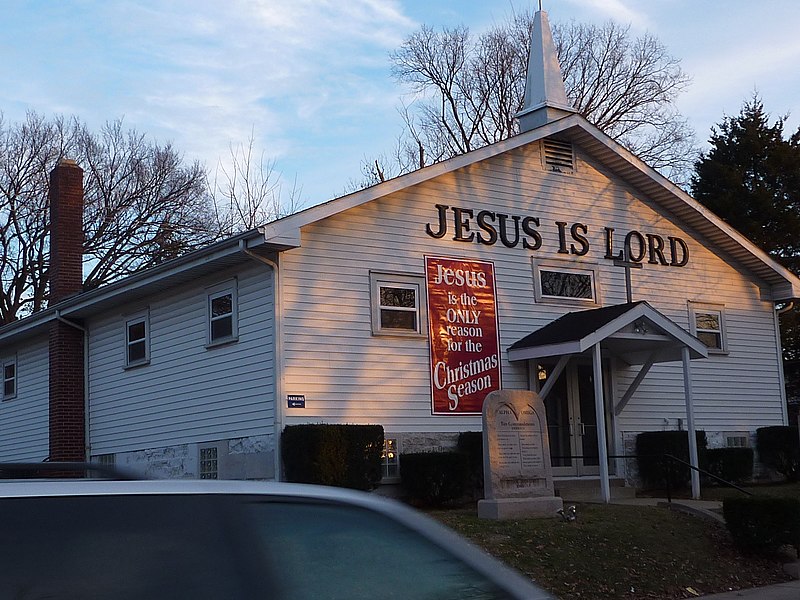Grace Fellowship Assembly of God, Bloomington, Indiana – Fellowship is what primarily draws people to religion (Wikicommons - Vmenkov).
Religiosity is moderately heritable—25 to 45% according to twin studies (Bouchard, 2004; Lewis and Bates, 2013). These figures are of course underestimates, since any noise in the data gets classified as ‘non-genetic’ variability. So the estimates would be higher if we could measure religiosity better.
But what does it mean to be religious? Does it mean adhering to a single organized religion with a clergy, a place of worship, and a standardized creed? This definition works fairly well in the Christian and Muslim worlds, but not so well farther afield. In East Asia, people often have more than one faith tradition: “If one religion is good, two are better.” Moreover, 'religion' has never controlled East Asian societies to the extent that Christianity and Islam have controlled theirs, as Francis Fukuyama notes in The Origins of Political Order. This word becomes even more problematic in simple societies. Did hunter-gatherers have religion? If we take the example of the Inuit, they believed in spirits of various kinds, but those spirits were indifferent to humans and their concerns, being not at all like the fellow in the Christmas jingle:
He sees you when you're sleeping.
He knows when you're awake.He knows if you've been bad or good,
So be good for goodness sake!
Simple hunter-gatherers had no idea that a moral God exists. Nor did they see morality as being absolute or universal. A human action could be good or bad, depending on who was doing what to whom. Morality could not be separated from kinship. Your first moral obligation was to yourself, then to your family, then to your close kin. Beyond, who cares?
So what exactly is the heritable component of religiosity? Or should we say components? These questions were addressed by a recent twin study, which concluded that "religiosity is a biologically complex construct, with distinct heritable components" (Lewis and Bates, 2013). The most important one seems to be 'community integration,' which is the desire to be among people who befriend each other and help each other on a regular basis. Much research shows that religious people have stronger social needs than the rest of us, and they tend to lose interest in religion when such needs are no longer met. When former Methodist church members were asked why they left their church, the most common response was their failure to feel accepted, loved, or wanted by others in the congregation (Lewis and Bates, 2013).
The second most important component seems to be 'existential certainty'—belief in a controlling God who will ultimately take care of everything. Belief in divine control reduces anxiety and actually increases one's sense of personal control. As such, it provides "an epistemic buffer from a range of factors such as unpredictability, instability, and concerns over mortality that exist in this world."
In sum, this study found that community integration accounts for 45% of innate religiosity and existential certainty for 11%. These two components represent most of the genetic variability.
Just one thing. The study was done with a sample of Americans who were 85.1% Christian, the rest being mostly atheist, agnostic, or ''no religious preference." Would the results have been similar with participants from the Middle East, Africa, or East Asia?
I don’t think so. Religiosity, by its very nature, should be very sensitive to gene-culture coevolution. It's moderately heritable and serves different purposes in different cultural environments. Any one religion will favor its own ways of being and acting, and people who conform will do better than those who don’t. Thus, over successive generations, the gene pool of believers will become characterized by certain predispositions, personality traits, and other heritable aspects of mental makeup. These characteristics will tend to persist even if the believers cease to believe and become secularized.
This point is made by the authors, albeit indirectly. On the one hand, a community of believers will modify their religion to suit their social and existential needs:
[...] religion per-sé may not be the sole organization or system able to fill the niche created by human needs for community and existential meaning. The succession, displacement, and evolution of religions can be viewed in this light as the shaping of religious systems by their adherents to maximize the extent to which their needs are met.
On the other hand, a religion will modify its community of believers by favoring the survival of those with the "right" mindset and by removing those with the “wrong” mindset:
[...] this ''exchangeable goods'' notion of religion may fail to acknowledge the tight fit between religious belief and human psychology: ''religious practices and rituals co-evolved with religiously inclined minds, so that they now fit together extremely well."
In short, Man has made religion in his own image, but religion has returned the favor. In a very real sense, it has made us who we are.
References
Bouchard, T. J. Jr., (2004). Genetic influence on human psychological traits: A survey. Current Directions in Psychological Science, 13, 148-151.
https://www.researchgate.net/profile/Thomas_Bouchard2/publication/241644869_Genetic_Influence_on_Human_Psychological_TraitsA_Survey/links/00b7d524a1ab5b5f9d000000.pdfLewis, G.J. and T.C. Bates. (2013). Common genetic influences underpin religiosity, community integration, and existential uncertainty, Journal of Research in Personality, 47, 398-405.
http://www.aging.wisc.edu/midus/findings/pdfs/1268.pdf





